#gilgamesh and enkidu at uruk
Explore tagged Tumblr posts
Text
Picard and Dathon at El-Adrel
I usually just do a few pictures from multiple episodes for these posts but the unhinged commentary between my friend @petracourtjester and I throughout this one was too good to not share. Plus, it’s “Darmok”.
For some context, this is her 1st time watching Star Trek and my 3rd time (I think?) watching "Darmok" specifically. First time I watched it I was too young to really understand what was happening.
Previous Many Days In the Life of a Trekkie posts: part 1, part 2



























#star trek#star trek the next generation#star trek tng#tng#darmok#jean luc picard#dathon#tamarians#data soong#geordi laforge#william t riker#beverly crusher#deanna troi#worf son of mogh#miles o'brien#james t kirk#jim kirk#captain kirk#amok time#star trek the original series#darmok and jalad at tanagra#gilgamesh and enkidu at uruk#picard and dathon at el-adrel#ap english#romeo and juliet#homoeroticism#metaphors#spirk#just a tiny bit of it#many days in the life of a trekkie
34 notes
·
View notes
Text
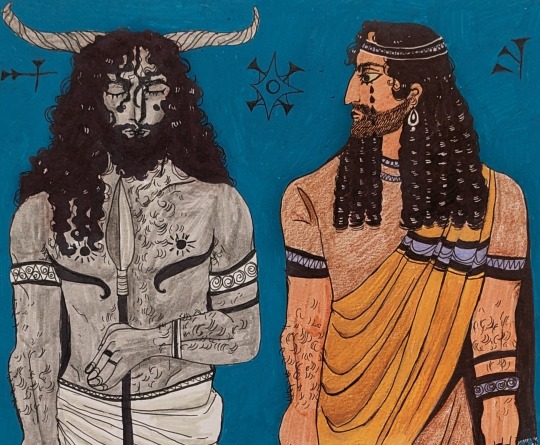
debuting the gilgamesh fanart on tumblr🫡🫡 (what dreaming about a meteorite that you love as you love your wife does to a mf)
#epic of gilgamesh#epic of gilgamesh fanart#epic poems#ancient literature#mesopotamia#uruk#gilgamesh#gilgamesh and enkidu#gay people#stay lit america#my art
350 notes
·
View notes
Text






Had to re-read The Epic Of Gilgamesh (This time the Sophus Helle translation) for class, so here are some of the doodles I made along with my notes
#the epic of gilgamesh#epic of gilgamesh#gilgamesh#enkidu#gilkidu#shamash#shamhat#humbaba#doodles#sketches#sketch#doodle#ancient literature#mesopotamian mythology#mesopotamia#uruk#ur-shanabi
42 notes
·
View notes
Text
The white sand crumbles beneath Gilgamesh’ feet.
The blood of the bull he had personally sacrificed in Enkidu’s honour stained it a deep scarlet, red as the blood that once flowed in Enkidu’s veins, that yet flowed in Gilgamesh’s - for after all his tribulations, the truth that he was a man still struck at him like a viper
Before him sits the baked clay coffin that houses his love. By him kneels a weeping woman, eyes painted, a prostitute’s cord-crown circling her braided black hair. Her name is Shamhat, his men reassure him, and she loved Enkidu dearly
About him sing the priests of the gods, exhorting Ereshkigal to hold the great Wild Man well. It was meaningless. Gilgamesh had seen the depths of Namtar, and it was naught but dust.
He longs for it, now. With Enkidu by his side, even dust would taste like the sweetest honey. And without him, even the richest wine was bitter and tasteless
Before him stands a great statue of gold, lapis in its eyes. It was wrong, all wrong. Beautiful, certainly, but the face was wrong. Too coldly serene, like a god's face. The sculptor never saw Enkidu alive.
It had taken the palace sculptors seven tries before Ninsun finally stepped him and forced him to approve the eighth. Seven statues for the seven nights that civilised his love, the seven nights that doomed his love
Far beyond the walls, Gilgamesh can see a flock of gazelles on the hillside. Beasts live unknowing and die without fear. A man could envy them
His hand falls and rests on Shamhat’s shoulder, heavy and pressing. She looks up with tear-stained features, clearly expecting a rebuke or an insult - and indeed, Gilgamesh was tempted. What was this priestess of Ishtar doing mourning one doomed by her patron ?
But he was tired. And hate did not become one mourning his love
“Cheer up girl”, he says, his voice heavy, “Everything dies. Even ones loved. Especially ones loved”
Kings are clay, and then dust. So are cities. All that lives is wild and untamed - gods and animals, shapeless and uncivilised
Writing tablets go to dust, too. But words on clay can be copied, and copied again, outlasting memory. Stories are like animals, as wild, as untamed, as shapeless
The dead eat dust. The dead eat clay and dirt, and words pressed into earth will always remain. Those gone speak with voices of earth
He turns to one of his advisors.
"Bring me a scribe," says Gilgamesh the king. He'll see his story written before he dies, “and tell him to prepare. The story of Gilgamesh and Enkidu is a long one”
#gilgamesh#enkidu#gilgamesh and enkidu#gilgamesh x enkidu#mesopotamia#babylon#Uruk#ur#angst#shamhat#funeral services#character death#epic of gilgamesh
39 notes
·
View notes
Note
no puedo sacar la canción de gilgamesh d destripando la historia 😔
que me has hecho????
socorro
HAHAHAHHAHAHA
youtube
Y al final se hacen colegas y se BESAN fuerte!
15 notes
·
View notes
Photo
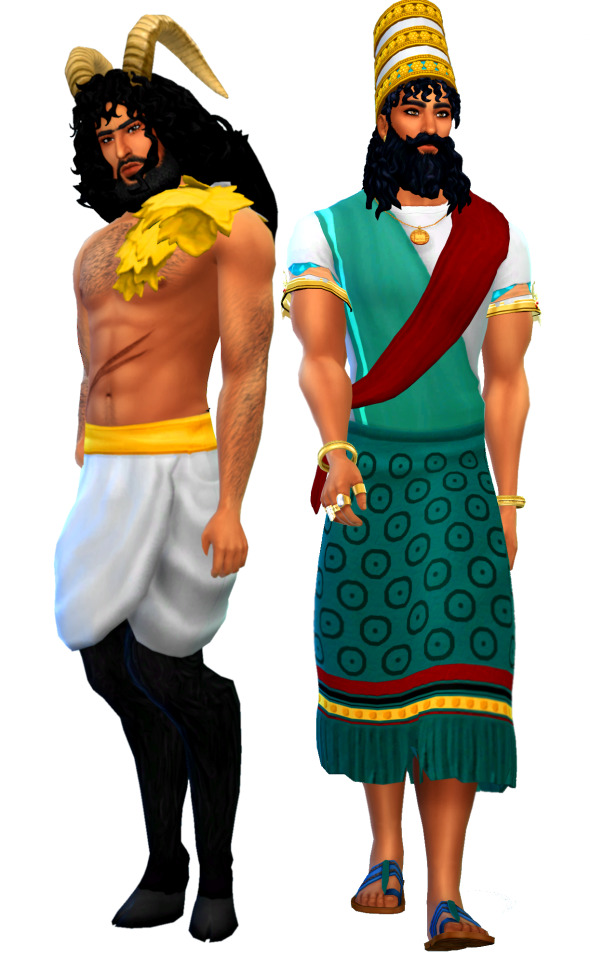
It is 4 am and I should be sleeping, but instead I’m trying to recreate the best bromance of all time in the Sims 4. Of course I’m talking about Enkidu and Gilgamesh.
#gilgamesh#epic of gilgamesh#enkidu#sumerian#mesopotamian#uruk#mythology#never meet your hero#enkidu is pure though protect him#bromance#mythological#sims 4#myth#sims 4 history#insomnia
96 notes
·
View notes
Text
#the epic of gilgamesh#sumerian mythology#sumer#mythology#sumerology#uruk#gilgamesh#enkidu#shamhat#umbaba#utnapishtim#most fuckable#mesopotamia#heroes
17 notes
·
View notes
Note
"It is unwise to insult your king with failing to engage in the banquet provided..." Caution is offered in the words though beneath an undercurrent of knowing, of observing something that troubles one he has charged with protecting Uruk and he cannot let it stand. For there to be something on her mind splits her attention that she can devote to the defence of the city. And it is his duty to provide for those in his charge.
"What keeps my blade from indulging in the grace of their king?" [ gil do i detect care in your actions? ]
HOW UNSLIGHTLY
"My king."
The motions come as second nature, a dip of the head followed, the lowering of the eyes before given the honor to gaze upon him, to speak. King Gilgamesh's warning is not misplaced, he is king and she his right, his warrior, his BLADE. To insult him by straying from the position bequeathed by the wise king was a grave error and one she would not have dared to risk under normal circumstances.
"This blade does not dispute such claims." Yet there does linger a stray thought it her mind that drives such reckless disregard. One that perhaps her master might know better than her the answer. Yoshitsune's head bows lower still, eyes casted in a deep shadow as honest words spill forward.-
"It is indeed unwise to not heed the call of her king. It is a shameful display that bares no repeating."
And falling silent.
Minamoto no Yoshitsune is no fool. Despite the clear, stark difference between herself and the current era summoned upon that fact remains true. In the past, the first precious days into her tenure had been spent consuming as much as she could upon this land's knowledge, every tablet, every archival, every drill. She grew fat on information, to the point that the blade could call the land her own and defend it thus.
Yet one thing was left accounted for. One thing that did not make sense no matter how much information she poured herself into.

"-I do not understand this."
The look that she cast out is does not bare the same luster that it would in the day. It was within time of quietness that the charade slips, that Ushiwakamaru, Shana oh slips away, the friendly familiarness of her disposition leaving her and revealing something cold in its wake. Minamoto no Yoshitsune is a woman of cunning as she is of ice, a thing barren in her emotional capacity that suited her just fine. It was such that made her so capable as a weapon for Yoritomo.
"Humanity....is such a wretched thing."
This was the BLADE of the king, one that only he and he alone would bear witness.
"I know of gratitude of humanity, it is fickle to the weapons that they forge with their wills." It is ugly, REVILED. Built upon the foundations of the forgotten, destroyed and devoured. There was not a single star that did not exist built upon remains of those before it. Personal experience had made it so that such lessons were carved into her very being. "And I am a blade charged with the preserving of precious lives. Yet they do not regard me as such. It is as if they....do not see the weapon before them."
Rider paused, her expression bleeding into frustrated confusion. For all that she knew of humanity, it was never something she could truly incorporate into her own logic. Humans were cruel, inherently so and that is a FACT, irrefutable and true. And yet, and yet-
"My king, are your people truly of that ilk? Why do they regard this blade as their own?"
#looks at enkidu. looks back at yoshitsune. looks back at the people uruk LOOKS BACK TO GILGAMESH#SCREAMS INTO MY HANDS. SORRY GILGAMESH your blade does not understand humanity. she was only taught to kill people help#not so local blade contemplates her place in bab because she genuinely feels free here and people look upon her kindly despite her bloodlus#ic.wander tales#resolutepath
2 notes
·
View notes
Text
A friend's worth || [CLOSED]
@soulsbetrayed

❝ .. Boredom truly is a hell of it's own. ❞
Perhaps peaceful days such as these should have been treasured, given what a rarity they were. And yet, for the magnanimous king, the day had offered him nothing of worth. It even made him long for the days of listening to the near endless requests of his people. He needed something. Anything to keep himself active in both body and mind. But what was there to do in such a confined space?
❝ No. It is pointless to simply sit around and question my next course of action. Especially when the alternative is much simpler. I will simply take action. ❞
If there was no excitement to be found, he'd simply make his own. Confining though Chaldea may be, it was still a place of limitless possibilities if one were to make use of the tools available to them. Perhaps he'd simply Rayshift himself to someplace for a bit of fresh air. No doubt there would be complaints of him using Chaldea's systems without any prior warning, but they would simply fall on deaf ears.
It was the king's right to follow his heart. And his heart yearned for adventure.
#soulsbetrayed#enkidu;#m: Gilgamesh;#v: Caster of Uruk;#Gil Rayshifting just to go on a leisurely walk?#Absolutely
2 notes
·
View notes
Text
Die Geschichte von Gilgamesh
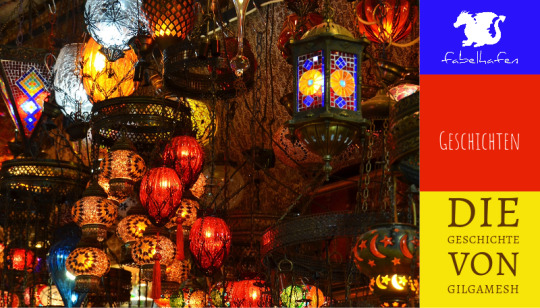
Es war einmal ein mächtiger König namens Gilgamesh, der in der Stadt Uruk lebte. Er war so mächtig, dass er dachte, er sei unbesiegbar und unsterblich. Aber eines Tages hatte er einen Traum, der ihn beunruhigte. Er träumte von einem wilden Mann namens Enkidu, der ihm gegenüberstand und ihn herausforderte.
Gilgamesh wollte den Traum deuten lassen und rief eine weise Frau herbei, die ihm sagte, dass Enkidu sein Schicksal war.
Er war verwirrt und besorgt, aber er beschloss, den wilden Mann zu suchen und herauszufordern. Als Gilgamesh Enkidu schließlich fand, waren sie zunächst Feinde. Aber als sie zusammenkämpften, erkannten sie, dass sie tatsächlich starke Verbündete sein könnten. Sie wurden Freunde und begannen, gemeinsam Abenteuer zu erleben. Eines Tages beschlossen Gilgamesh und Enkidu, zum Wald des Zedernberges zu reisen, um den mächtigen Riesen Humbaba zu besiegen. Als sie den Wald erreichten, forderte Humbaba sie heraus, aber mit Mut und List gelang es den beiden, den Riesen zu besiegen und seine Schätze zu erbeuten.
Doch als sie zurückkehrten, stellte sich heraus, dass ihre Freundschaft nicht für immer halten würde.
Die Göttin Ishtar verliebte sich in Gilgamesh und forderte ihn auf, ihr Liebhaber zu werden. Doch er lehnte sie ab, was Ishtar wütend machte. Als Rache schickte sie den Stier des Himmels, der die Stadt Uruk bedrohte. Gilgamesh und Enkidu kämpften gegen den Stier, aber Enkidu wurde schwer verletzt und starb schließlich an seinen Wunden. Gilgamesh war tieftraurig über den Verlust seines Freundes und begann, nach Wegen zu suchen, um Unsterblichkeit zu erlangen. Er machte sich auf den Weg zu einem Mann namens Utnapischtim, der angeblich Unsterblichkeit erlangt hatte. Utnapischtim sagte Gilgamesh, dass er einen unüberwindbaren Fluss überqueren müsse, um die Unsterblichkeit zu erlangen. ER folgte den Anweisungen und schaffte es, den Fluss zu überqueren, aber als er das Geheimnis der Unsterblichkeit erfuhr, erkannte er, dass es für ihn zu spät war.

Gilgamesh kehrte schließlich zu seiner Stadt zurück und erkannte, dass das Leben endlich ist und dass die Freundschaft und die Abenteuer, die er mit Enkidu erlebt hatte, für immer in seinem Herzen bleiben würden.
Und so endet die Geschichte von Gilgamesh, einem mächtigen König, der erkannte, dass selbst die mächtigsten Menschen nicht unbesiegbar und unsterblich sind. Die Geschichte von Gilgamesh lehrt uns, dass wahre Stärke und Unsterblichkeit nicht durch Macht oder Reichtum erlangt werden können, sondern durch die Freundschaft und die Abenteuer, die wir im Leben erleben. Wir sollten uns auf das konzentrieren, was wirklich wichtig ist - unsere Beziehungen zu anderen Menschen und die Erfahrungen, die wir im Leben sammeln - denn das sind die Dinge, die uns letztendlich unsterblich machen können. Die Geschichte von Gilgamesh stammt aus der sumerischen Mythologie, die in Mesopotamien (dem heutigen Irak) zwischen dem 4. und dem 2. Jahrtausend v. Chr. entstand. Der "Epos von Gilgamesh" ist eines der ältesten bekannten literarischen Werke der Welt und erzählt die Geschichte des mythischen Königs Gilgamesh, der in der sumerischen Stadt Uruk lebte. Die Geschichte wurde in Keilschrift auf Tontafeln geschrieben und ist heute in verschiedenen Fragmenten erhalten. Der Epos von Gilgamesh beeinflusste auch andere Kulturen in der Region und wurde später in der akkadischen, babylonischen und assyrischen Mythologie aufgenommen und weiterentwickelt. Read the full article
#Enkidu#Fabel#Fabeln#Frau#Freundschaft#Geschichte#Geschichten#Gilgamesh#Ischtar#Ishtar#Mann#Märchen#Märchenwelt#Mythen#Schicksal#Traum#Uruk
1 note
·
View note
Text
Enkidu FGO is absolutely a troublemaker. Enkidu Source Material was also absolutely a troublemaker, but of course he was! He was literally created to be the equal to the #1 Mesopotamian troublemaking king, Gilgamesh. It's basically a requirement
I see it from time to time, but there's an opinion that Enkidu was killed in the Epic because he was a troublemaker. This is not true, but easy to understand why it's a popular conclusion
The decision to kill Enkidu was made after he and Gilgamesh made some glaringly poor choices--the first one being the slaying of Humbaba, and the second the slaying of Gugalana. I think people attribute the reason Enkidu was killed instead of Gilgamesh to Enkidu's actions after Gugalana was killed, which something I will get to in a moment. It might be different in Fate, and depending on what version of the epic you read some details differ, but generally here's what went down
Gilgamesh one day gets the idea that he and Enkidu should go into the Cedar forest and kill its guardian, the monster Humbaba. Now, wood was a very sacred and rare material in ancient Mesopotamia, cedar wood in particular. Hence why the gods had such a powerful monster keeping it safe. Gilgamesh goes to Enkidu with his grand idea to hunt down and kill Humbaba, but he needs Enkidu's help to find him. Enkidu is very hesitant at first and tells Gilgamesh the equivalent of, "Dude that's a terrible idea. Humbaba is extremely powerful. Absolutely Not." Gilgamesh urges Enkidu to reconsider, because together they can survive anything! It'll be easy with the two of us and it'll be so much fun!
Enkidu is eventually persuaded and agrees, and together they track down and kill Humbaba, as well as his seven sons. They worship/thank the gods by sacrificing Humbaba-meat to a fire (as ya do), and they cut down a RIDICULOUS AMOUNT OF CEDAR while they're at it, then sail home down the Euphrates on a newly carved boat and a bunch of extra wood. Needless to say, The Gods Were Not Pleased.
But since this was King Gilgamesh and Enkidu, they chose to simply take note of this transgression and not do anything to punish them so long as they didn't do something equally grievous in the future.
Fast forward a bit and Ishtar is upset that Gilgamesh doesn't want to sleep with her. Gilgamesh heavily insults her, naming off dozens of her past lovers and how she treated them, driving her to tears. She goes up to the heavens and pitches a fit to her father, Anu, about the rejection. She threatens to raise zombies all over Mesopotamia unless he gives her the Bull of Heaven (Gugalana) to lay siege to Uruk in vengeance against Gilgamesh. Sending out this divine beast is a HUGE deal, not a decision to make lightly. However, Anu doesn't want zombies. He gives her the Bull.
Ishtar immediately sends it down to Uruk where it promptly kills a BUNCH of people and causes a heap of environmental disasters. Enkidu fights it off alone for a while, but it isn't until Gilgamesh joins the fight that they are able to take it down. Gilgamesh makes the final blow, killing him, and with Gugalana defeated the kingdom celebrates victory. They worship/thank the gods by sacrificing Gugalana-meat to a fire, and Ishtar shows up again. She is very upset that Gugalana was slain. How DARE you two kill the Bull of Heaven? She says. Do you have any idea how important that was? She says. Enkidu responds by insulting her and throws a chunk of the meat from Gugalana's hind at her head. She is humiliated and goes back up to the heavens. I think this is where people get the idea that Enkidu was a troublemaker, and that this was why he was chosen over Gilgamesh to die. However. It is not. Once again, The Gods Were Not Pleased. Gilgamesh and Enkidu are out of control. They call a meeting.
Gilgamesh and Enkidu, as a pair, had:
Slain two divine beasts (which they knew the importance of)
Cut down a sacred forest (which they knew the importance of)
Heavily insulted the same goddess to her face. The patron deity of the kingdom, no less!
Three major transgressions! But the most concerning ones were the deaths of Humbaba and Gugalana, and were the primary discussion at the god-meeting. The others are bonuses.
The gods decide the fitting punishment is death. However, killing both Gilgamesh and Enkidu is too severe and must choose one.
Now there's no literal written reason for Enkidu being chosen. But looking back on the Epic as a whole, we can infer the reason he was...is Gilgamesh.
Enkidu was created by the gods to rein Gilgamesh in, to control him. Gilgamesh on his own was unruly, unchecked, overpowering and selfish. By giving him Enkidu, he had someone he could be unruly with, who would check him, who could match his power and balance his needs. Enkidu was literally made to be his perfect match, and thus he became the most important thing in the whole world to Gilgamesh. Some might say that Gilgamesh's wanton disregard was rubbing off on Enkidu, or that Enkidu's unwavering loyalty and support was making Gilgamesh overconfident, and that he was killed because he was no longer fulfilling his purpose. However, I do not think that's the reason, either.
There's this neat thing in Mesopotamian literature and poetry where the theme of the work appears again and again. Prose is often repeated, whole stanzas are recycled over and over, words and the way grammar is used, and lines are reused in patterns. Very often, a work begins and ends the same way. The Epic of Gilgamesh is a shining example of this and does it constantly. So,
Just like in the beginning of the Epic, in order for the gods to rein Gilgamesh in, they use Enkidu.
--
TLDR; Enkidu was not killed because he was a trouble maker. By killing both Humbaba and Gugalana, both he and Gilgamesh were in trouble but only one of them needed to die as punishment. Enkidu was chosen because he was created to control Gilgamesh--both through his life and through his death.
#wowie this took longer to write than i thought it would#mesopotamia my beloved#enkidu#gilgamesh#anyway everybody should read the epic of gilgamesh. right now
554 notes
·
View notes
Text
I think I shared this on another platform already, but never here. I am drawing right now, and somehow something triggered me to recall this.
When I draw those slices-of-life stories of Chaldea, I MOSTLY only draw CasGil (Wise King). Sometimes KoGil, but I rarely draw ArcherGil (Tyrant).
And whenever you guys see me drawing ArcherGil, in most cases, he still wears a robe or tunic etc., which indicates that he is the version of Gilgamesh who is still ALIVE, living in Uruk with Enkidu—not the servant one.
The first reason is that, even though my friend info-dumped me about Fate throughout our high school years, my real introduction to Fate was the Babylonia anime. This means CasGil is the first Gilgamesh I actually knew and grew to like.
The second reason, as funny as it is, is simply because I never actually summoned ArcherGil in FGO😅 I guess the fate between us is thin, and he has never answered my call so far.
The third reason: After I started watching the Babylonia anime, the second thing I went after wasn’t UBW or FZ, but the Epic of Gilgamesh itself. (I only fully started shipping Enki x Gil after finishing the Epic. The final push caused my free fall into this abyss.) This experience shaped my view of Gilgamesh's character.
Because Tyrant Gilgamesh literally grows into the Wise King version, it's a progressive evolution—not entirely two separate people.
If I'm just drawing something funny, then okay, both of them can interact in the same scene and create something laughable. But if I try to dig into something more serious, then it feels...
awkward, at least for me.
In the end, I just choose one of them as the main character based on the background setting. Story set in Uruk? Archer, then. Story in Chaldea? Caster's part to play.
You may ask, what about KoGil? Why do I give him a free pass while excluding ArcherGil? Well, there is a split between KoGil and his two adult selves. I can still view all three Gils as parts of a continuous timeline, but the fact that KoGil hasn’t met Enkidu yet, and doesn’t always get along with his adult self, makes him not the central part of this topic. So he is free from this argument.
So most of the time, KoGil is just......well, KoGil, doing his own thing. He knows Enkidu, he enjoys staying beside Enkidu, but he isn’t as clingy toward Enkidu as the other two Gils.
Just as Alexander (kid version of Iskandar) said, he is fully aware of Iskandar's path and history, but none of it feels real to him. Because he (as Alexander) never really experienced those events, Iskandar's path probably feels just like some stories he’s read in books.
In my eyes, Caster Gilgamesh is the "real" one. I’m not saying ArcherGil or KoGil are fake. What I mean is, Caster is the one who actually went through all the different stages of life. He is the one who finished the journey of searching for immortality. He is the one who completed all the developments of Gilgamesh's character. He knows grief, he knows despair, and he overcame them. All these experiences feel real to him, and he knows them by heart, which build his character and personality as a person. He himself is the crystallization of the Epic of Gilgamesh.
But for ArcherGil or KoGil, despite knowing their fate and what will become of them, they still haven’t experienced it.
Yet I still see them as three pieces of one same puzzle, they all exist inside.
26 notes
·
View notes
Text
I just realized something. If the First City was Uruk like most people seem to think, then its fall was deeply, deeply ironic. Spoilers for Heart’s Desire.
So the theme of the Epic of Gilgamesh is that immortality is better achieved through one’s legacy than through, you know, physical immortality. Gilgamesh is propelled onto his quest to find immortality by the death of his buddy/totally not boyfriend Enkidu and learns from the first man to gain immortality how to gain immortality, gloriously messes it up, and comes to the conclusion that the only way to gain true immortality now is by creating a legacy that will outlive you.
BUT, because the fallen cities are usually traded by their monarch to the Masters in exchange for the life of a romantic partner or spouse (excluding the Third City, at least), and going by the assumption that the King with a Hundred Hearts is Enkidu and the Manager of the Royal Bethlehem is Gilgamesh, Gilgamesh in the Fallen London universe never learned this lesson. Instead, he gained physical immortality at the cost of everything: his city, the Surface, and the very person he gave it all up for, the very person whose death would’ve propelled his quest for true immortality. And, from what I’ve heard from people who’ve completed Heart’s Desire (my ambition is Nemesis and I haven’t even gotten to the Iron Republic yet, so I wouldn’t know), while the King resents the Manager for saving his life, the Manager has never lost his love for the King.
All this adds a second layer of tragedy to the backstory of the First City. The Epic of Gilgamesh is the oldest story we have, or at least the oldest story we have in written form; in a meta sense, Gilgamesh gained what he sought. But in the Fallen London universe, London fell before the tablets containing the story could be translated (translation began sometime in the late 1860s, and the first somewhat complete version was published in 1900; London fell in 1862), if the story even existed at all. Gilgamesh never learned his lesson. He still yearns for the person he sacrificed everything for yet is unable to have him. He lives on in-person, but his memory has been forgotten by time. In a sense, he lost more than the version of him in our world; we still have the story of Gilgamesh, but in Fallen London, we don’t even have that.
89 notes
·
View notes
Text


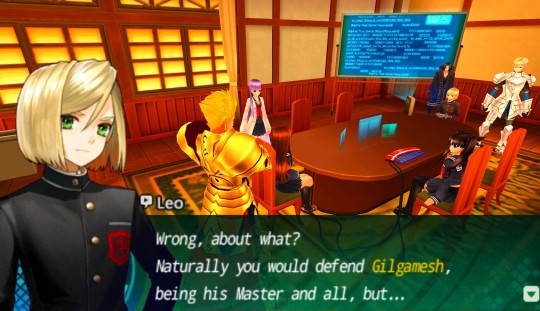

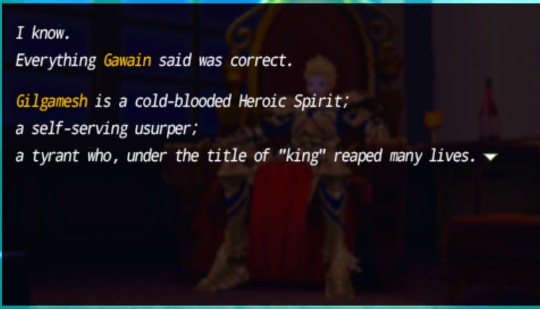
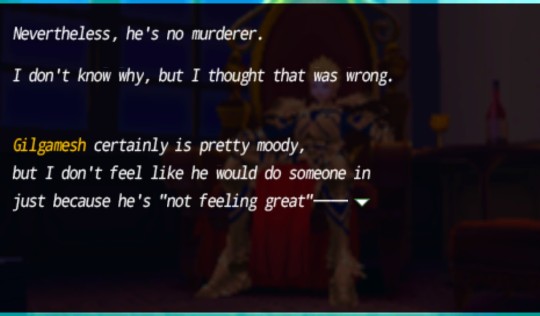
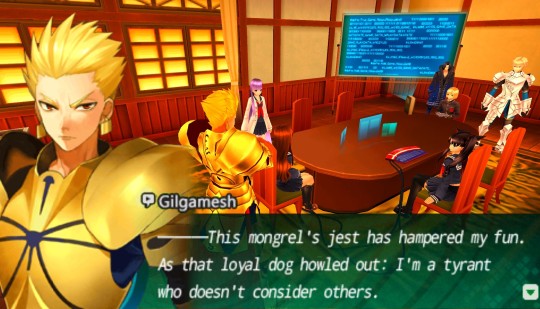
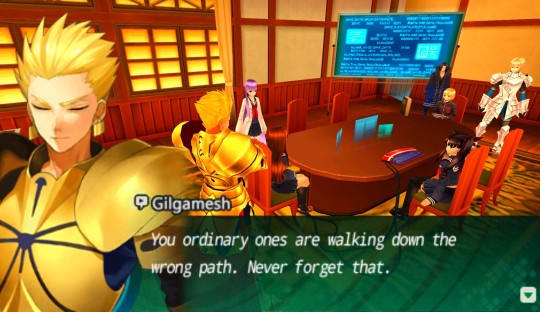
This, right here was the exact moment I started to realize that Nasu was about to do something great with both Hakunon and Gilgamesh's characters.
There's a thing with Hakuno and it's that she isn't the classic kind character who does good deeds without even considering the rest.
She analyzes the situation, figures out what's the best course of action and yet she will do the exact opposite of what she's thinking if her heart considers that there's something wrong.
An example of this is when the noise was consuming Shinji at the beginning, she thinks that it is useless to try and she might even die and the best is to run away but she runs and tries to save him. This is no different.
Who else but Hakunon knows how cruel can Gilgamesh can be? He was very close to killing her just because she looked at him the wrong way and he has been acting like an outsider who finds her suffering (and other's suffering) amusing.
She also received Hans opinion on him. About what he did, about what he is. An arbiter who can't understand and can't be understood.
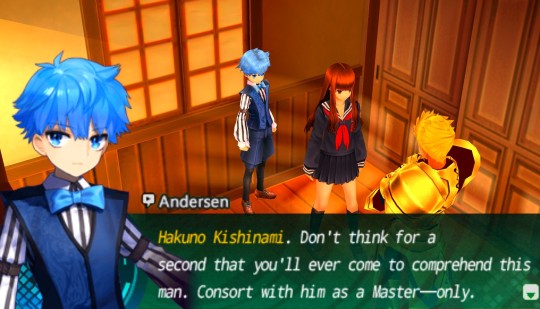
It's very easy to agree with the perfect example of a good servant but, she opens her mouth and says that no, that Gilgamesh being a murderer is wrong.
Now, Gilgamesh doesn't exactly like the idea of people not being able to understand him nor him being unable to understand others. Which is why Enkidu made him so happy, being understood is something that even a King needs.
So, what Hakuno did was obviously significant.
Yet, he proceeds to tsun his way out of the situation and call himself a monster, because he obviously wasn't expecting this, specially because he himself has a good portion of guilt for what he did to Uruk and probably accepts that title of a tyrant so easily because of it. Gil is the type of character who wouldn't accept redeeming himself because it would mean to ignore the suffering he caused, so just like his way to mourn Enkidu is not having a second friend, his way to apologize to Uruk was dedicating the rest of himself to them and own the weight of his crimes.
Ah, im rambling. But what I want to say is that this moment was perfectly constructed. Nasu constructed the path for this moment very carefully, adding things here and there. Convos and actions. And it's very important because this is the turning point, this is the very reason why Hakuno was able to reach Gil's heart later.
#gilgamesh#hakuno kishinami#Hakunon#fate ccc#Im so happy that the game is finally translated because now I sabor this properly.#gilhaku#meta
95 notes
·
View notes
Text
New Authorial Goal: Write a Gay Ass Fight Scene Like this:
"When Gilgamesh arrives, the two heroes seize each other, butting heads like wild bulls, careening through the streets, crashing into walls, and making the houses tremble. The confrontation could hardly be more primal, stripped down to the element of male pride. Enkidu's anger is besides the point. There are no principles to be upheld, no justifications and counterjustifications. The battle is as silly as a schoolyard fight, yet there is something beautiful about its energy. There is also a deeply erotic element in it. This is not a fight to the death, as in the Iliad or Beowulf. It is a fight at the end of which each man will be able to say to his opponent, "Now I know you," or even (as Jacob said to his angel) "I will not let thee go, except thou bless me." It is an entrance into intimacy, and as close to lovemaking as to violence."
-Stephen Mitchell in the introduction to his 2004 translation of the Epic of Gilgamesh
the oldest story in the world is screamingly bisexual and I NEED to match some of this energy
also bc Jason is the lens through which I mentally interact with the world: I think he'd view this as a deeply Romantic and aspirational way to fight. he yearns to be known. he communicates through battle. he wishes his introductions could have been so profound and he wishes that through them he would have been so understood. His Gilgamesh, though, knows him not, and the people of the city of Uruk see him only as a wild thing no matter how he cuts his hair
#jason todd#damian's tomfoolery#epic of gilgamesh#brujay#only in implication but I feel that the brujay crowd could appreciate it#Robin made for his Batman and yet failing to complete each other#the grief#yall can see the vision I trust#also#jaytim#cause my ass is using this quote in my jaytim fic#and also I feel the silly as a school fight thing can feed into#the Titans Tower dumbassery#as it doesn't quite fit with UtRH
23 notes
·
View notes
Text

❝ You should know better than to make such heartfelt pleas. It stands to reason that a king would do everything in his power to see such an earnest wish fulfilled. ❞
Naturally, he had meant to say a close friend, rather than a king. But he tended to be a bit coy when it came to more sentimental gestures that he knew the other could very possibly tease him over. His body materializes a short distance behind his close companion, eyes set upon the vast and endless sky above them.
❝ Hmph. The scenery is rather mundane, admittedly. But even the mundane has immeasurable value under the correct circumstances. ❞

“Mn, how serene.”
They look up to the clear skies. “I wish there was someone to share it with.” A laugh escapes them as they reach out.
Oh this world is beautiful in all its ways shame this has to come to past
4 notes
·
View notes